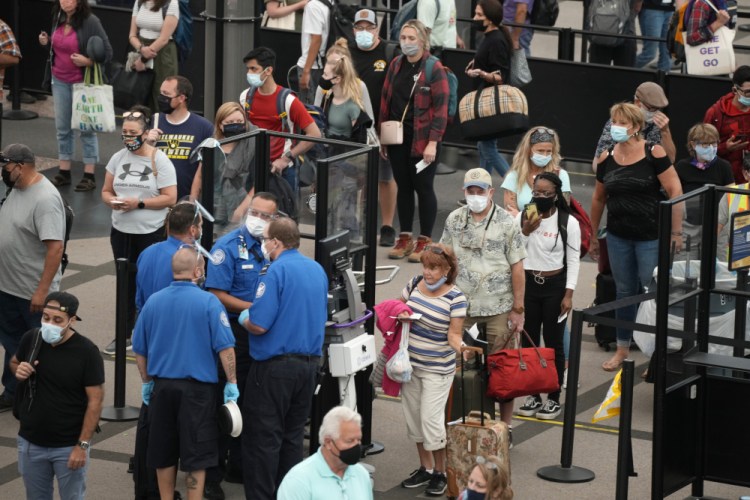WASHINGTON — The U.S. will ease foreign travel restrictions to the country beginning in November, allowing foreigners in if they have proof of vaccination and a negative COVID-19 test, the White House said Monday.
The new rules will replace a hodgepodge of restrictions that had barred non-citizens who had been in Europe, much of Asia and certain other countries in the prior 14 days from entering the U.S. The changes will allow families and others who have been separated by the travel restrictions for 18 months to plan for long-awaited reunifications.
White House COVID-19 coordinator Jeff Zients announced the new policies, which still will require all foreign travelers flying to the U.S. to demonstrate proof of vaccination before boarding, as well as proof of a negative COVID-19 test taken within three days of flight. Biden will also tighten testing rules for unvaccinated American citizens, who will need to be tested within a day before returning to the U.S., as well as after they arrive home.
Fully vaccinated passengers will not be required to quarantine, Zients said.
The new policy will replace the patchwork of travel bans first instituted by President Trump last year and tightened by Biden that restrict travel by non-citizens who have in the prior 14 days been in the United Kingdom, European Union, China, India, Iran, Republic of Ireland, Brazil and South Africa.
Those travel bans had become the source of growing geopolitical frustration, particularly among allies in the UK and EU where virus cases are far lower than the U.S. The easing comes ahead of Biden meeting with some European leaders on the margins of the United Nations General Assembly this week.
“This is based on individuals rather than a country-based approach, so it’s a stronger system,” Zients said.
The EU and UK had previously moved to allow vaccinated U.S. travelers into their territories without quarantines, in an effort to boost business and tourism travel. But the EU recommended last month that some travel restrictions be reimposed on U.S. travelers to the bloc because of the rampant spread of the delta variant of the coronavirus in America.
The Centers for Disease Control and Prevention will also require airlines to collect contact information from international travelers to facilitate tracing, Zients said.
It was not immediately clear which vaccines would be acceptable under the U.S.-system and whether those unapproved in the U.S. could be used. Zients said that decision would be up to the CDC.
Zients said there would be no immediate changes to the U.S. land border policies, which continue to restrict much cross-border travel with Mexico and Canada.
The announcement was met with cheers by the air travel industry, which has lost significant revenues from the pandemic-related declines in international travel.
“We applaud the Biden Administration for establishing a path to re-opening international travel to the U.S.,” said Delta Air Lines spokesman Morgan Durrant. “Science tells us that vaccinations coupled with testing is the safest way to re-open travel and we are optimistic this important decision will allow for the continued economic recovery both in the U.S. and abroad and the reunification of families who have been separated for more than 18 months.”
Worldwide, air travel is still down more than half from pre-pandemic levels, and the decline is much sharper for cross-border flying. By July, domestic travel had recovered to 84 percent of 2019 numbers, but international travel was just 26 percent of the same month two years ago, according to figures released this month by the airline industry’s main global trade group, the International Air Transport Association.
The numbers are similar but not quite as stark for the U.S., where international travel in August was 46 percent of that in August 2019, according to Airlines for America. Arrivals by non-U.S. citizens were only 36 percent of the 2019 normal.
British Prime Minister Boris Johnson tweeted that he was “delighted” by the news. He said: “It’s a fantastic boost for business and trade, and great that family and friends on both sides of the pond can be reunited once again.”
Foreign Secretary Liz Truss tweeted that the move was “excellent news for travelers from the UK to the US. Important for out economic recovery, families and trade.”
Britain scrapped quarantines for fully vaccinated travelers from the U.S. and the European Union in early August, and has been pushing for Washington to ease its rules. But Johnson said Sunday that he did not expect the change to come this week.
Airlines hailed the U.S. decision as a lifeline for the struggling industry. Tim Alderslade, chief executive of industry body Airlines U.K. said it was “a major breakthrough.”
Shai Weiss, chief executive of Virgin Atlantic, said it was “a major milestone to the reopening of travel at scale, allowing consumers and businesses to book travel to the U.S. with confidence.”
“The U.K. will now be able to strengthen ties with our most important economic partner, the U.S., boosting trade and tourism as well as reuniting friends, families and business colleagues,” Weiss said.
French entrepreneur Stephane Le Breton, 45, expressed joy that he will finally be able to book his trip to New York city that had been put on hold over the virus restrictions.
“I felt frustrated that I couldn’t go to the U.S. as I had planned. It just didn’t make sense that authorities weren’t letting in vaccinated EU citizens.”
Le Breton, who lives in the Boulogne suburb of Paris, said he feels that the U.S. lifting the restrictions is a sign that the world is heading to a new, better phase of the coronavirus pandemic.
“It’s a happy day. Big Apple, here I come!”
The new air travel policy will take effect in “early November,” Zients said, to allow airlines and travel partners time to prepare to implement the new protocols.
AP writers Jill Lawless in London, Thomas Adamson-Koumbouzis in Paris and David Koenig in Dallas contributed.
Send questions/comments to the editors.


